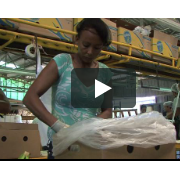
This section is for broad trade and labour issues. For a list of day to day articles related to labour, see this page.
The combined effect of structural adjustment programmes, increased capital mobility and the globalisation of production has resulted in mass job losses and precarious employment in many countries over the past 30 years. Attacks on social welfare, healthcare and education, as well as privatisations, high unemployment and strong arm tactics against trade union organising, have rolled back many of the hard-won fruits of struggle. In the name of global competitiveness, workers are set against each other in a race to the bottom which only the bosses can win.
International free trade and investment agreements are an important vehicle for the transfer of power from labour to capital. As transnational corporations are granted ever greater rights to trade and invest across the global economy, workers are increasingly cast as commodities in global value chains over which they have no control. The transnational capitalist elites that sit on top of these global networks of production can freely switch suppliers in search of lower labour costs or higher productivity, leaving behind a social devastation from which successive generations are often unable to recover.
The new generation of twenty-first century FTAs are now seeking to intensify this imbalance still further by removing the social standards and market regulations that have traditionally served to limit the power of transnational capital. The elimination of these regulatory ‘barriers’ to trade forms a central pillar of the most recent wave of FTAs, through which transnational corporations will be freed from any restrictions which might have allowed labour to participate in the benefits of trade or investment. Workers will create the wealth, and corporate elites will accumulate it.
One strategy previously advocated by trade unions in the global North was to press for social chapters in FTAs as a means of mitigating the worst effects of market liberalisation. This strategy is now widely recognised as ineffective, since such measures could never compensate for the devastation caused by bringing domestic enterprises into unequal competition with transnational corporations. The record of deindustrialisation and mass unemployment in the wake of trade liberalisations imposed on the peoples of Africa and Latin America shows just how high a price workers have paid for such policies. The negative experiences of US, Canadian and Mexican workers as a result of NAFTA are a reminder that workers in richer countries are also vulnerable.
Trade unions in the global South have long played an important role in mass movements of resistance to free trade and investment agreements. In Korea, many thousands of KCTU members participated in national mobilisations against both the US-Korea and EU-Korea FTAs. Workers in Central America actively opposed CAFTA, such as those from the state power and telecommunications sector in Costa Rica and education workers in Guatemala. Now Northern trade unions are joining these movements of resistance: all major European trade union federations have come out against CETA and TTIP, for example, just as the AFL-CIO called for a halt to the TPP negotiations for fear of the impact on US workers. The global union federation PSI has also spoken out against service liberalisation agreements such as TiSA, which threaten to undermine public services and public sector jobs alike.
Migrant workers’ associations have also formed part of the movement against FTAs. Free trade and investment agreements have resulted in social dislocations that have forced people from their farms, jobs, families and communities into exploitation as migrant workers, either internally within their own states or in other countries. At the same time, the growing number of FTAs that include provisions on temporary labour mobility have been condemned for endangering workers still further, driving people to migrate while still denying them basic rights in countries where their presence is highly precarious and often used by employers to undermine existing labour standards still further. Only when workers are no longer relegated to the status of commodities serving the economic strategies of capitalist elites can there be any hope of their liberation from such exploitation.
In the Asia Pacific region, unions have recently come together to strengthen their ability to intervene in international trade and investment related processes, by creating a network of trade unions called Unions for Trade Justice network. UTJ is coordinated by the Global Union Federations and aims to facilitate intervention by their affiliates and unions interested in challenging the free trade agenda and furthering the agenda of trade justice. UTJ’s formative document can be found here.
Contributed by John Hilary, and Susana Barria (PSI)
last update: January 2020
Image: "Minimum wage?!" Singapore Clarke Quay Elgin Bridge underpass 2013 (by RSCLS street art collective)








